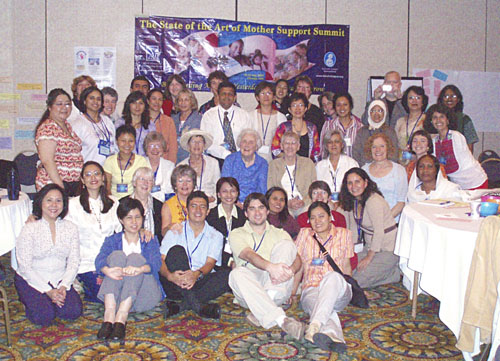WABA-LLLI: The State of the Art of Mother Support Summit -
Breastfeeding Mother - Yesterday, Today and Tomorrow

For most of human history, breastfeeding was supported by the mother's family and neighbors. As traditional support systems faded in the Western world in the early and mid-1900s, infant nutrition became the realm of medical practice. Marketing practices of formula companies undermine support for breastfeeding as they attempt to convince women "breast milk is best, but formula works too". In developing countries, as families move from the rural areas into urban centres, traditional support has also begun to disappear. Support for breastfeeding is a necessary element for many women to succeed in their breastfeeding experience. All of society needs to provide encouragement, practical advice, empathetic listening, and basic information to the breastfeeding woman.
Recognizing the importance of Mother Support, WABA and La Leche League International (LLLI) planned a Summit on the State of the Art of Mother Support in Chicago in July 2007. More than fifty participants from 23 countries, representing 20 organizations, met for the 2-day WABA-LLLI Mother Support Summit. One of the outcomes of the Mother Support Summit was reaching a consensus on a collaborative global activity that would promote, expand and address the need for support for the breastfeeding mother. This effective action worldwide for improving/increasing Mother Support was dedicating World Breastfeeding Week as a vehicle to increase visibility and support/resources for Mother Support.
Another outcome of the Mother Support Summit was the endorsement of the Global Initiative for Mother Support (GIMS) for Breastfeeding to formulate policy, facilitate a holistic approach and expand the awareness of the need for mothers to be supported in breastfeeding. The GIMS Endorsement also acts as a rallying document to bring more people on board a global campaign.
During the Summit, participants shared many aspects and showed the diversity of mother support leading to best practices at national and regional levels: anecdotes about the Founders of La Leche League International (LLLI) living the experience of nurturing, developing, and expanding to reach and support mothers and babies worldwide ; the power of story telling in support groups; community breastfeeding support in Sudan; peer counseling programs in Bangladesh; support needed by women who are breastfeeding and working in the formal and informal sectors; the Code and lack of support in China; the influence of maternity home practices and birth practices in India; breastfeeding as an economic issue and women's rights in the Philippines; and maximising the internet/web for mother support promotion/networking worldwide.
Summit participants were energized by members of the WABA YOUth Initiative present at the Summit . The youth are keen and enthusiastic advocates of breastfeeding, promoting and protecting breastfeeding through the perspectives of human rights, reproductive health and gender equality. An example of a youth initiative is RUMBA: R ed U nida por las M adres B ebés y su A limento (United Network for Mother´s Babies and their Nutrition/Nourishment) aimed at protecting health practices for mothers, children and families of Latin America and the Caribbea .
Attendees were also encouraged by the WABA Men's Initiative established to create an enabling environment where men, particularly fathers, participate actively and share responsibilities with women in optimally caring for their infants and young children, through advocacy, education and capacity building. A "Snapshot" of laws, culture, support in operation, current issues of importance, other family issues or indicators of interest, and recommendations were presented by the Men's Initiative from Cameroon , Mexico , Mozambique and Sweden .
The e-dialogue (English and Spanish speaking) set the course for the Summit and involved 63 participants from 28 different countries. Working groups at the Summit summarized and prioritized the discussions posed in the e-dialogue under the title: "Abreast With The Times" :
1. The elements or components that have the most effective and positive influence on supporting the breastfeeding mother are:
• The value that society places on breastfeeding
• Empowerment of mother (self esteem, trust, value, confidence, knowledge, experience, validation) from her own resources and/or supporting environment
• Emphasis of breastfeeding as a public health issue using an integrated approach
• Focus on antenatal care
• Empowerment through education and training
2. Obstacles that hinder or impede a positive experience:
• Sufficient policies but insufficient action
• Aggressive marketing of formula and lack of Code monitoring and enforcement
• Health care system does not value breastfeeding and does not listen to mothers
• Lack of accurate information and misinformation
• Lack of support
• Present life style doesn't value breastfeeding
3. Collaboration and renewed networking/interconnection/cooperation with Mother Support organizations and individuals providing an opportunity to exchange information, experience, tools, materials, lessons learned, strategies, referral and data collection
• Continue dialogue in Mother Support Task Force E-Newsletter
• Put together E-Dialogue and E-Newsletter
4. Effective actions
• Ride on momentum of World Breastfeeding Week
• Extract Mother Support articles from international documents to bring to life and operationalize Mother Support to use as entry points for promotion, advocacy and fund raising.
• Develop a process to recognize, certify, increase and strengthen MOTHER SUPPORT facilitators of mother support groups
• Designate International Day recognizing Mother Support
• Link with non breastfeeding support groups that share a common approach
• Conduct conferences e.g. link with WABA Global Forum 2010
• Establish a decade for mothers in order to value motherhood
• Influence change in pre-service curriculum (integrate breastfeeding into curriculum)
Mother Support in all its aspects and diversity is needed because "the main and most destructive message when it comes to lactation is precisely doubt: doubt about frequency, feeding schedule, and quality of milk". In quoting Derrick and Patrice Jelliffe: "Breastfeeding is a confidence game".




